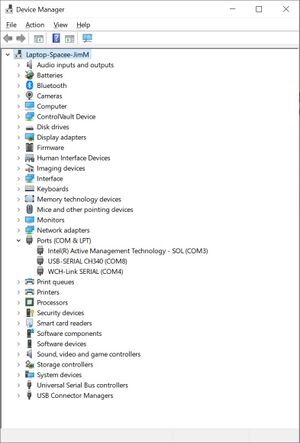Getting Started with CH32V003: Difference between revisions
Jump to navigation
Jump to search
No edit summary |
|||
| Line 2: | Line 2: | ||
https://www.youtube.com/watch?v=L9Wrv7nW-S8&ab_channel=EEVblog<br> | https://www.youtube.com/watch?v=L9Wrv7nW-S8&ab_channel=EEVblog<br> | ||
I had to learn more about this chip. | I had to learn more about this chip. | ||
==Where to get a CH32V003 development board== | ==Where to get a CH32V003 development board== | ||
I ordered this board: along with the programmer and cable for $7.50: | I ordered this board: along with the programmer and cable for $7.50: | ||
| Line 34: | Line 35: | ||
The programmer comes with a 4-conductor cable, wire colors: brown (1), red (2), orange (3), yellow (4) | The programmer comes with a 4-conductor cable, wire colors: brown (1), red (2), orange (3), yellow (4) | ||
==WCH-Link Utility== | |||
This software tool connects with the WCH-LinkE programmer, and allows the user to read, write, examine | |||
program data written to the RISC-V device. | |||
https://www.wch.cn/downloads/WCH-LinkUtility_ZIP.html | |||
==Notes & References== | ==Notes & References== | ||
| Line 39: | Line 44: | ||
compatible with the STM8S003F3, https://www.st.com/resource/en/datasheet/stm8s003f3.pdf, at 1/3rd the price. | compatible with the STM8S003F3, https://www.st.com/resource/en/datasheet/stm8s003f3.pdf, at 1/3rd the price. | ||
The UFQFPN20 package doesn't appear to be pin compatible. | The UFQFPN20 package doesn't appear to be pin compatible. | ||
==Current Project Status== | |||
Today, 4/15/23, I started to work with this nanoCH32V003 development board. | |||
I soldered header pins to the development board. I then connected GND, DIO, and 3V3 signals | |||
from the 3-wire programmer interface to the WCH-LinkE board. | |||
'''My Wiring''' | |||
'''Target LinkE''' | |||
GND - brown - GND | |||
DIO - yellow - SWDIO | |||
3V3 - red - 3V3 | |||
When I attempted to use the WCH-Link Utility with the WCH-LinkE, the tool indicated | |||
I needed to update the firmware. After a few attempts, this process completed successfully. | |||
Now, using WCH-Link Utility, I'm able to read the flash program from the target and save it to a file. '''(Good first step)''' | |||
I built the sample GPIO project, "GPIO_Toggle", downloaded the resulting GPIO_Toggle.bin file to the target board. | |||
'''NOTHING! No Blinky!''' | |||
I'm able to reprogram the board using the saved flash data. - That works! | |||
Revision as of 09:23, 15 April 2023
After watching David Jones's YouTube "EEVblog 1524 - The 10 CENT RISC V Processor! CH32V003",
https://www.youtube.com/watch?v=L9Wrv7nW-S8&ab_channel=EEVblog
I had to learn more about this chip.
Where to get a CH32V003 development board
I ordered this board: along with the programmer and cable for $7.50: https://www.aliexpress.us/item/3256805035436953.html Repository for board with documentation and example code: https://github.com/wuxx/nanoCH32V003 The github repo's README.md file: https://github.com/wuxx/nanoCH32V003#readme Schematic: https://github.com/wuxx/nanoCH32V003/blob/master/hardware/nanoCH32V003.pdf I created a RISC-V folder under Documents like so: C:\Users\Jim\Documents\RISC-V While inside the RISC-V folder, I cloned the repository like so: git clone https://github.com/wuxx/nanoCH32V003.git Inside the "doc" folder is the zipfile, CH32V003EVT.ZIP, with "EVT" folder inside. Unzip the EVT folder into "doc", so you have the example code available. CH32V003 website: http://www.wch-ic.com/products/CH32V003.html The device on the development board is: CH32V003F4U6, with 18 GPIOs in a QFN20 package
MounRiver Studio IDE
Download the latest version of MounRiver Studio IDE from the official website: http://www.mounriver.com/ and install it.
More info concerning the board
According to the schematic, the LED is connected to PD6
WCH-LinkE v1.0
After plugging in the WCH-Link USB-Serial programmer, the device should display in Window Device Manager

The programmer comes with a 4-conductor cable, wire colors: brown (1), red (2), orange (3), yellow (4)
WCH-Link Utility
This software tool connects with the WCH-LinkE programmer, and allows the user to read, write, examine program data written to the RISC-V device. https://www.wch.cn/downloads/WCH-LinkUtility_ZIP.html
Notes & References
As noted in the YouTube EEVblog, the TSSOP20 package for this part appears to be pin compatible with the STM8S003F3, https://www.st.com/resource/en/datasheet/stm8s003f3.pdf, at 1/3rd the price. The UFQFPN20 package doesn't appear to be pin compatible.
Current Project Status
Today, 4/15/23, I started to work with this nanoCH32V003 development board. I soldered header pins to the development board. I then connected GND, DIO, and 3V3 signals from the 3-wire programmer interface to the WCH-LinkE board. My Wiring Target LinkE GND - brown - GND DIO - yellow - SWDIO 3V3 - red - 3V3 When I attempted to use the WCH-Link Utility with the WCH-LinkE, the tool indicated I needed to update the firmware. After a few attempts, this process completed successfully. Now, using WCH-Link Utility, I'm able to read the flash program from the target and save it to a file. (Good first step) I built the sample GPIO project, "GPIO_Toggle", downloaded the resulting GPIO_Toggle.bin file to the target board. NOTHING! No Blinky! I'm able to reprogram the board using the saved flash data. - That works!